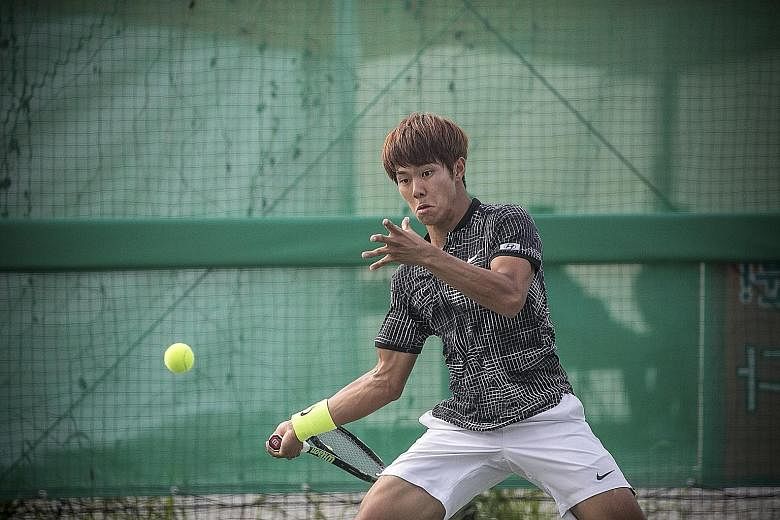ASAN (South Korea) • To improve its chances in the boys' team tennis event at the National Sports Festival in Asan, Mapo High School in Seoul brought in a ringer from Jecheon, two hours south-east of South Korea's capital.
His name was Lee Duck Hee, and he had first caught the coach's eye when he was in elementary school.
Mapo High's players pressed against the fence along the dusty hardcourts and chanted their support while Lee crushed forehand winners past his bespectacled opponent in the final.
The 6-1, 6-1 win took little time - no surprise, given that Lee is the best teenage player in South Korea, and a professional ranked 143rd in the world.
"Seeing the level of skill, power and returning is totally different than high school level," said Jeong Yeong Sok, his doubles partner at the tournament.
But, even among the game's elite, Lee, 18, is exceptional.
He is deaf, and no deaf player in the sport's professional era has reached these heights.
In tennis, simply seeing the ball is believed to be insufficient. Hearing the ball, top players say, enables faster reactions - a crucial advantage in a sport where blazingly fast serves and groundstrokes mean that even the tiniest fraction of a second matters.
"There are so many different spins in tennis, and I can hear a lot of them coming off someone's racket because I know what they all sound like," said Katie Mancebo, a college tennis coach and volunteer coach for the US deaf tennis team.
"But a deaf player doesn't know that sound, so they have to focus more on what the other person is doing, how they're making contact, and what the ball looks like as it's coming over the net."
Joo Hyun Sang, tennis coach at Mapo High School, was initially sceptical of Lee's potential.
"When I met him the first time, I had doubts," he said. "But I grew confident from watching him develop and improve. I was very confident he could do it."
Though already the second-highest-ranked player of professionals 18 and under, Lee has become a breakout star.
While he has yet to play a main-draw match at an Association of Tennis Professionals tournament or a Grand Slam, he has reached the final of a Challenger event, the level below the ATP World Tour, for the first time in September in Taiwan, and has made two semi-finals since.
Reaching the No. 1 ranking is Lee's goal, but first he aspires to become the best player in South Korean history, which would mean passing the career-high of Lee Hyung Taik, who reached No. 36 in 2007 and won one ATP singles title.
Lee does not believe that his hearing impairment will hold him back but he acknowledged another physical disadvantage might: At 1.75m, he is a shrub amid the redwoods of professional men's tennis.
"Of course I do want my player to be treated as a normal player, but we have some opportunities and some advantages from being deaf, business-wise," said Lee Dong Yeop, his agent. "Because no one has done this before."
NYTIMES

